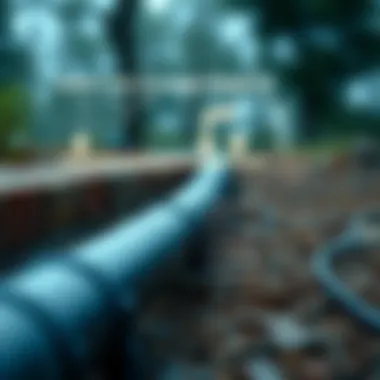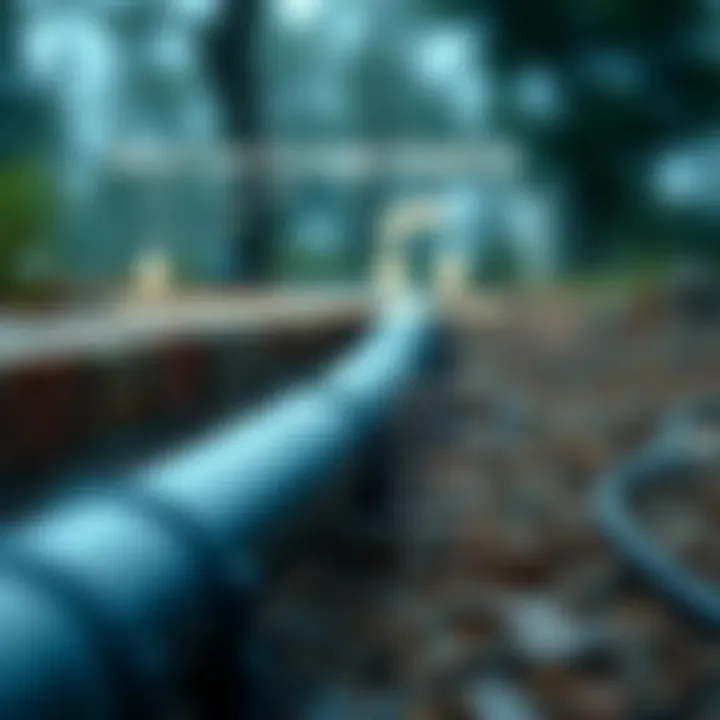Home Warranty Companies and Sewer Line Coverage


Intro
Homeownership comes with its share of responsibilities, one of which is maintaining the often unseen components of your home, such as the sewer line. For many homeowners, a malfunctioning sewer line can lead to significant stress and financial strain. Understanding the ins and outs of home warranty companies that provide coverage for these buried pipes is more crucial than ever. Navigating the complex world of sewers and warranties may feel like trying to decipher a foreign language, but breaking it down into bite-sized pieces can make all the difference.
In this article, we will explore why sewer line coverage is not just a luxury but an essential part of safeguarding your home. We will examine the various types of coverage available, weigh the benefits and limitations of different warranty plans, and highlight key aspects to consider when selecting a provider. Through this comprehensive guide, homeowners will be better equipped to make informed decisions that ultimately protect their living spaces from unforeseen complications.
Coverage Options
The coverage provided by home warranty companies can vary greatly. Understanding the nuances of these options is vital as it can determine how well your sewer line is protected should issues arise.
Types of Coverage Available
When looking into the coverage options available, here are some typical categories you might encounter:
- Sewer Line Coverage: This typically includes repairs or replacements for the main sewer line that runs from your home to the municipal system.
- Secondary Line Coverage: Some companies offer extra coverage for secondary lines, such as those leading to sprinklers or outbuildings.
- Drainage Issues: This might extend coverage to related services like fixing blockages or backups within the system.
It's important to note that not all coverage is created equal. Some companies may exempt certain types of damages, or may only cover issues when they arise under specific circumstances, leaving homeowners with the short end of the stick if they aren't careful.
Liability Coverage Explained
When discussing coverage, one must also consider liability aspects. If your sewer line causes damage to a neighbor's property, will the warranty company cover you? Typically, standard home warranties do not cover liability claims. Homeowners may need separate insurance for those scenarios. Talk about a headache! Assessing your policy's liability clause is crucial; after all, ignorance isn’t bliss when it comes to financial responsibilities.
Key Considerations
When you're in the market for a home warranty that includes sewer line coverage, there are critical factors to take into account.
Factors to Assess When Choosing Insurance
- Reputation of the Company: Do a little digging online! Reviews on places like Reddit or consumer protection sites can offer insights.
- Claim Process: Look for clarity and simplicity in the claims process. You don't want to deal with unnecessary hassle when facing a sewer emergency.
- Service Provider Access: Be sure to check if you can access local contractors or if the provider forces you to use their preferred vendors. This could affect response times.
Understanding Policy Limits
Policy limits refer to the maximum amount your warranty company will pay for repairs or replacements. Here’s why knowing this is essential:
- Total Coverage: Being aware of these limits ensures you understand what projects or repairs could result in out-of-pocket expenses.
- Annual Limits: Some warranties include limits on what they will cover within a year, not just per incident. This could leave you stranded if major repairs are needed later on.
"Warranties can vary as much as the homes they protect; knowing the details is the key to a hassle-free experience."
By taking these factors into account, you can craft a thorough checklist that guides you toward the right home warranty. The mission is to empower homeowners to navigate the sometimes murky waters of home warranties, especially when it comes to peripheral but vital aspects like sewer lines.
As you dive into this journey of selection, keep in mind that a well-thought-out choice can save you from heartache and hefty bills down the road.
For further resources on home warranties and related topics, consider visiting Wikipedia or Britannica.
The Importance of Home Warranties
Home warranties are often overlooked, but they play a crucial role in safeguarding homeowners against unexpected repairs and replacements. They act as a safety net, offering peace of mind for both new and older homes. While conventional insurance covers damage due to accidents or disasters, home warranties ensure that regular wear-and-tear issues, especially essential systems and appliances, are taken care of without breaking the bank.
Understanding Home Warranties
At their core, home warranties serve as contracts between homeowners and warranty companies, stipulating what systems and appliances are covered against failure. Unlike a standard homeowner's insurance policy, which may focus more on catastrophic events, home warranties zero in on the day-to-day functioning of your home. Imagine waking up to a flooded basement because your sewer line is clogged. In such scenarios, a home warranty can save significant out-of-pocket repair costs. Moreover, understanding the nuances of these warranties, such as coverage limits and service fees, is imperative for homeowners looking to maximize their benefits.
Key Components of a Home Warranty
When exploring home warranties, several key components come into play:
- Coverage Scope: This defines what systems and appliances are included. Typically, sewer lines, plumbing, electrical systems, and major appliances are covered.
- Service Fees: Homeowners usually pay a flat fee when requesting service. Knowing this cost upfront is essential for budgeting.
- Duration of Coverage: Home warranties can last for a year or more. Be aware of renewal terms, as they may change with time.
- Exclusions: Every warranty has its exclusions, which detail what is not covered. Familiarizing yourself with these is crucial to avoid unpleasant surprises.
Why Focus on Sewer Lines
Sewer line issues can create a hornet's nest of problems for homeowners, with potential costs running into the thousands. Many homeowners may disregard the sewer lines until something goes awry. However, focusing on this area is essential. Over time, tree roots, debris, or sediment can accumulate within pipes, causing blockages that require urgent attention. Moreover, sewer line repairs are often expensive, and without adequate coverage, the financial burden can be overwhelming. By paying attention to the specific coverage related to sewer lines within a home warranty, homeowners are making a proactive choice to protect one of their home's most critical systems.
"A good home warranty can be the difference between a minor inconvenience and a major financial disaster."
In essence, understanding the importance of home warranties, particularly regarding sewer line coverage, is vital for maintaining a home without unnecessary stress. Being informed allows homeowners to make decisions that best fit their unique situations and protect their investments.
Defining Sewer Line Coverage
Sewer line coverage is a vital component of many home warranty plans, yet it is often misunderstood or overlooked. This coverage essentially provides financial protection against the costly repairs associated with problems that occur in the sewer line systems of homes. Understanding this topic is crucial for homeowners, as it can streamline disaster management and provide peace of mind, especially considering that sewer line issues can disrupt everyday life.


What is Covered Under Sewer Line Insurance?
Sewer line insurance typically covers a range of issues related to the sewer lines that run from your home to the main city sewer or septic tank. Some of the covered issues may include:
- Clogged Sewer Lines: This is often the most common problem, which may arise due to tree roots, foreign objects, or the natural breakdown of the line.
- Broken or Collapsed Pipes: Over time, sewer pipes can develop cracks or even collapse due to ground shifting or aging materials.
- Damage from Natural Disasters: Events such as heavy rain or earthquakes can lead to significant sewer line issues, and coverage can mitigate repair costs.
- Sewer Backup Problems: This alarming situation involves raw sewage backing up into your home, creating health hazards and expensive damages.
By having this type of insurance, homeowners can put their minds at ease knowing they are protected against unexpected expenses tied to their sewer systems.
Common Exclusions in Sewer Line Policies
While sewer line insurance can provide ample protection, there are common exclusions that homeowners should be aware of:
- Routine Maintenance: Most policies do not cover regular maintenance like cleaning out a line or routine inspections. This means that homeowners are still responsible for performing routine care.
- Negligence and Abuse: If damage is caused by the homeowner's negligence, such as ignoring obvious signs of a problem, or misuse of the system, coverage may be denied.
- Non-Mechanical Failures: Policies usually exclude damage related to a lack of proper care or the normal wear and tear of pipes not immediately recognized.
- Pre-existing Conditions: Any issues that existed before the policy's inception will typically not be covered, which highlights the importance of having insurance before problems arise.
Being aware of these exclusions can help homeowners make more informed decisions when selecting a warranty provider.
Assessing the Need for Sewer Line Coverage
When it comes to homeownership, covering the bases is crucial, especially when considering the often overlooked aspect of sewer lines. A solid understanding of why this coverage is necessary can save homeowners from significant financial and emotional stress down the line. Evaluating the need for sewer line coverage can provide a safety net that reassures homeowners they won’t be caught flat-footed if a mishap occurs beneath their property.
Identifying Risks of Sewer Line Issues
Sewer line problems can spring up like weeds in a garden; you may not see them coming until it’s too late. One of the most common issues is tree root invasion, where roots find their way into pipes, leading to blockages. Additionally, wear and tear over time can create cracks or breaks, leading to severe leaks and property damage.
- Signs of Trouble:
- Slow draining sinks and toilets
- Unpleasant odors near sewer lines
- Water pooling in your yard
Failure to identify these risks can lead to costly repairs. For example, getting a trenchless pipe replacement could run into thousands of dollars. Did you know? According to data from the American Society of Civil Engineers, up to 30% of home repair costs go towards sewer issues. Over time, these issues can cause structural damage and even reduce your property’s value.
Cost Implications of Ignoring Coverage
Homeowners face a crucial decision when it comes to sewer line coverage: do I invest in it, or roll the dice? Ignoring the need for sewer line coverage can turn a minor inconvenience into a financial hurricane. Without warranty coverage, you may find yourself bearing the brunt of these expenses all on your own.
The main costs associated with sewer line repairs can include:
- Excavation Costs: Digging up the yard can be labor-intensive and quite expensive, especially in established neighborhoods with mature landscaping.
- Pipe Replacement: Whether you’re opting for traditional or trenchless methods, the cost can range from $3,000 to $25,000 depending on the damage.
- Cleanup: Potential damage to your property could also involve cleanup costs—discolored walls, damaged flooring, and other repair needs stemming from water damage might add to the bill.
Homeowners should consider these costs against the average cost of sewer line coverage, which usually hovers between $50 and $100 per month.
"An ounce of prevention is worth a pound of cure." – Benjamin Franklin.
In this case, paying for coverage could lead to substantial savings and peace of mind. Assessing the needs for sewer line coverage isn't just smart; it’s a necessary step in maintaining the integrity of one's home.
Key Features to Look for in Warranty Companies
When navigating the complex world of home warranties, particularly those covering sewer lines, it’s crucial to focus on key features that can significantly affect your experience. Homeowners need to understand not just what these companies offer, but how their policies can impact their peace of mind, finances, and overall satisfaction.
Response Times and Customer Support
One of the first things to consider is how swiftly a warranty company responds to service requests. When dealing with sewer line issues, time can be of the essence. If there's a blockage, a leak, or any sort of breakdown, the last thing you want is to be left waiting around while a customer service representative takes their sweet time to assist you. Ideally, look for companies that emphasize quick response times.
A good test of customer support is the method of communication they provide. Is it via phone, chat, or email? Better yet, do they offer 24/7 support? In emergencies, having a real person on the other end of the line to guide you can make a world of difference. If you’re always talking to an answering machine, or worse, waiting for a callback, it's time to reconsider your choice.
"Timeliness in customer support is crucial; delays can lead to greater issues down the line."
Coverage Limits and Deductibles
Next, examine the coverage limits and deductibles. Understanding these elements helps in avoiding surprises when the bill arrives. Most companies have specific caps on what they are willing to pay out for certain repairs or replacements, and these limits can vary significantly. It’s wise to check the fine print to see if the limits are sufficient for your needs.
Deductibles are another part of the puzzle. How much will you have to pay out-of-pocket per claim? If your deductible is too high, it may negate your savings and you'll find yourself wondering if the warranty is worth it. Therefore, it’s essential to ensure that both the coverage and deductibles are reasonable and clear. A little homework upfront can save a lot of headaches later.
Reputation and Reviews
Lastly, consider the reputation of the warranty company. A company might look great on paper, but their actual performance is often revealed through customer reviews. Websites like Reddit and consumer advocacy groups can offer insights into real-life experiences with these companies. Look for patterns in feedback—whether good or bad.
A company with a consistent stream of negative reviews may indicate larger systemic issues, such as poor coverage terms or bad customer service. Conversely, high ratings often correlate with solid response times, proper coverage, and a willingness to stand behind their promises.
By focusing on these key features—response times, coverage limits with deductible considerations, and reputation—you can better position yourself to select a warranty provider that will meet your needs, particularly for those often-overlooked sewer line issues.
Top Home Warranty Companies Covering Sewer Lines


Choosing a reputable home warranty company that covers sewer lines is cardinal for homeowners. Sewer line issues can arise unexpectedly and can lead to significant damage and financial strain if not covered adequately. Hence, evaluating top home warranty companies helps in navigating the complexities associated with sewer line repairs and replacements. By understanding the specific attributes of these companies, homeowners can make educated decisions that ultimately safeguard their investments and ensure peace of mind.
Company A Overview
Coverage Details
Company A provides comprehensive coverage on sewer lines, which includes repairs to the main sewer line from the house to the city connection. What sets it apart is its inclusion of not just standard repairs but also certain types of preventative maintenance options that allow homeowners to manage their sewer lines efficiently. This aspect of coverage, while not universal among competitors, is highly appreciated by many as it helps avoid bigger issues down the road. Often, customers gravitate toward this company for its transparency in coverage limits and deductibles, making it a sound choice in the landscape of home warranties.
Pros and Cons
On the plus side, Company A enjoys a solid reputation for fast service response times. Customers report that the claims process is straightforward, which adds to its appeal. However, it�’s pertinent to note that some users have flagged higher deductibles associated with certain repairs, which can be a drawback for budget-conscious homeowners. Thus, while the strengths are significant, potential clients should weigh these factors before signing on the dotted line.
Company B Overview
Coverage Details
Company B offers a unique angle with its sewer line coverage by including both tree root intrusion and other external damages. This is a notable departure from many competitors, marking it as a favored option for homeowners residing in areas with larger, mature trees. The extended coverage for issues that can occur due to soil shifting or freezing pipes further enhances its attractiveness. Such inclusion can save homeowners from harsh financial realities when these less predictable problems arise.
Pros and Cons
While Company B's comprehensive policy coverage is a significant advantage, it does come with its own quirks. Reports suggest longer wait times for service during peak seasons. While they're typically responsive, having to wait on urgent repairs can lead to frustration. Thus, for customers prioritizing speed, this could be a turn-off. Balance must be struck between thorough coverage and timely service.
Company Overview
Coverage Details
Company C differentiates itself by offering a tiered warranty plan for sewer line coverage, allowing homeowners to choose from basic to premium coverage levels. Such flexibility means that each homeowner can select a plan that best suits their needs and budget. This range of options ensures that unexpected expenses are kept at bay, and the idea of being covered for major line replacements is appealing.
Pros and Cons
A clear advantage of choosing Company C is its wide network of contractors, providing homeowners with a choice of providers in their area. This can lead to quicker service and resolution of issues. However, some customers have raised concerns about the clarity of coverage between the tiers, occasionally leading to misunderstandings during the claims process. It is wise for potential customers to thoroughly clarify these points before proceeding with their choice.
Understanding the offerings of different companies is critical to ensuring proper sewer line coverage.
In summary, while the choice of a home warranty company can feel overwhelming, knowing the pros and cons of the top contenders gives homeowners the insight needed to protect their sewer lines effectively. Whether it’s Company A’s transparency, Company B’s extensive coverage, or Company C’s flexible options, each plays a role in meeting varied homeowner needs.
Comparative Analysis of Coverage Options
When it comes to home warranties, especially those covering sewer lines, a thorough comparative analysis of coverage options is essential. This section is crucial as it arms homeowners with the right information to make informed choices. Understanding the various offerings by different companies can spell the difference between facing hefty bills or having peace of mind when plumbing issues arise. This segment delves into the specifics, looking at cost comparisons and customer experiences to give a well-rounded view of what's available in the market.
Side-by-Side Comparisons of Costs
Navigating through the costs associated with sewer line coverage can often feel like walking through a maze. By performing a side-by-side comparison, homeowners can pinpoint the variations in premiums, deductibles, and overall coverage limits among various companies. Here’s a breakdown of what to consider:
- Premiums: Annual or monthly fees can vary greatly, with some companies offering competitive rates while others might charge a premium for more extensive coverage. For instance, some might charge around $400 to $600 annually, while others may go upwards of $900.
- Deductibles: This is the amount you’ll have to pay out of pocket before the coverage kicks in. Savings can be had if you pick a company with lower deductibles. Companies like Choice Home Warranty might offer deductibles around $75, while others might require upwards of $125 or more per service call.
- Coverage Limits: Not all warranties cover the same amount for sewer line repairs. While one plan may limit repairs to $500, another could cover as much as $3,000 or more for significant issues.
Such a comparison can uncover hidden costs and highlight which plans deliver the best bang for your buck. It's prudent to not only look at the sticker price but also dive into what exactly is covered under each plan.
Evaluating Customer Experiences
Customer experiences serve as a wealth of information, often echoing the effectiveness and reliability of companies. Seeing how different homeowners have navigated their claims processes gives invaluable insights. Consider the following:
- Rated Service Levels: Companies may boast fine print about their coverage, but customer reviews paint a clearer picture. Homeowners often turn to sites like Reddit or Trustpilot to share their satisfaction or dissatisfaction with claims processing and customer service.
- Response Times: Timeliness can be pivotal. An ideal scenario is quick responses to service requests. Anecdotal evidence suggests that some homeowners had to wait several days for a technician, while others had service within hours. Tracking down these responses can be a game changer in selecting a provider.
- Claims Satisfaction: The ease of filing a claim can determine whether a warranty is worth keeping. Learning if other customers faced hurdles or had an easy time can influence a potential provider’s appeal.
"A well-informed decision about home warranty services doesn’t just depend on the numbers; it also hinges on what others have lived through. Customer experiences should supplement cost comparisons when considering sewer line coverage."
To sum up, exploring costs alongside customer experiences offers a multifaceted look at home warranty options. It lends clarity to the choices at hand, allowing homeowners to weigh their options properly and avoid unexpected pitfalls.
Benefits of Choosing a Home Warranty
When it comes to protecting your home, many homeowners may overlook the critical role that a home warranty can play. Choosing a home warranty, especially one that includes coverage for sewer lines, can significantly shield property owners from financial troubles stemming from unexpected repairs. Understanding the multiple dimensions of these benefits is essential for making an informed decision.
Financial Security and Peace of Mind
A home warranty offers vital financial security, particularly when dealing with the often-overlooked issues of sewer lines. Plumbing problems can spiral out of control quickly and lead to hefty repair bills—sometimes running into thousands of dollars. Having a warranty in place acts like a safety net, making it less likely that you’ll find yourself drowning in debt when a sewer line issue arises.
This peace of mind is invaluable. Homeowners can sleep easier at night knowing that, should a sewer line issue occur, they won't face the stiff financial strain that comes with immediate repair costs. For instance, getting a plumber out for an emergency repair can cost anywhere from a few hundred to several thousand dollars, depending on the severity of the situation. With a home warranty attached to your property, however, these costs may be significantly reduced or even covered, minus a small service fee.
Additionally, many home warranties include preventative maintenance checkups, which can identify potential sewer line issues before they escalate into major problems. This proactive approach can save homeowners not just money but also time and unnecessary stress, reinforcing the notion that a home warranty is a sound investment rather than just an extra expense.
Convenience in Home Management


Selecting a home warranty extends beyond just financial safety; it introduces unparalleled convenience to home management, especially concerning sewer maintenance. Consider this: managing a household involves juggling many responsibilities. From ensuring your roof doesn’t leak to managing your HVAC system, the list is extensive. That’s where the convenience factor comes in.
With a home warranty, you gain the advantage of having a dedicated resource for repairs and maintenance. Most warranty companies have a network of reliable contractors, making it easier for you to get quality service without resorting to guesswork in sourcing a plumber or handyman. When a sewer line problem arises, you simply contact your warranty provider, and they handle the rest. It’s a streamlined process that saves you from the headaches usually associated with finding service professionals—running through a list of recommendations and hoping for the best.
Moreover, many plans allow you to make service requests online or via a mobile app, making it incredibly user-friendly. This convenience can make a world of difference, specifically in emergencies, when quick action often determines the outcome. When chaos strikes, the last thing you want is extra hassle. Letting your warranty provider work out the details allows you to focus on more pressing tasks.
"A home warranty can be likened to a financial lifebuoy, providing essential support when the waters of home management become turbulent."
In summary, the benefits of choosing a home warranty that covers sewer lines are twofold: it provides financial security while offering a convenient solution to home management challenges. For homeowners, this adds considerable value and peace of mind, making it a smart choice in today’s unpredictable housing landscape.
Challenges with Sewer Line Coverage
When it comes to owning a home, few things can be as daunting and complex as ensuring your sewer lines are properly covered. The challenges associated with sewer line coverage not only influence how homeowners approach warranty services but also dictate the kind of support they receive in times of need. Given the intricacies and potential hazards linked to sewer line issues, it's vital that homeowners understand the hidden struggles that may arise in this area.
Limitations of Coverage
One of the first hurdles that can trip up homeowners is recognizing the limitations of coverage provided by most warranties. Many warranty companies may include sewer lines in their coverage, but the extent of that coverage often leaves much to be desired.
- Specific Case Scenarios: Homeowners should be wary that not all sewer line issues are covered. For instance, damage caused by tree roots may fall under exclusions in the warranty agreement. Common exclusions can also comprise normal wear and tear or damages stemming from improper installation.
- Coverage Limits: Additionally, even when sewer line issues are covered, companies often impose strict payout limits. A $5,000 limit might seem generous until the full scope of the repairs adds up to $10,000—with no assistance from the warranty.
This discrepancy can lead to a rude awakening when a homeowner finds themself facing unexpected costs despite having a warranty in place. A house that feels like a well-insured haven may suddenly turn into a financial burden amid repair crises.
Navigating Claims Processes
A major aggravation in dealing with sewer line warranty claims is the claims process itself. Gaining approval for repairs can feel like pulling teeth at times. Here are some critical aspects to consider:
- Documentation Requirements: Most warranty companies will require extensive documentation before approving a claim. Homeowners need to document everything meticulously—from photographs of the damaged area to repair estimates. Missing a step can delay the process significantly.
- Time Constraints: Some warranties may add another layer of complexity by requiring claims to be filed within a specific timeframe after the issue surfaces. Failing to comply puts the burden squarely back on the homeowner.
In many cases, navigating this bureaucratic maze can lead homeowners to frustration. Each engagement may feel like a game of chess, where the warranty company is determined to protect its interests, often at the expense of the homeowner's peace of mind.
Managing maintenance of a vessel as critical as the sewer system shouldn't feel like a battle with a faceless corporation. Educating oneself about these challenges serves as a protective measure for homeowners, positioning them to tackle the nuances of sewer line coverage with greater confidence and awareness.
Making the Right Choice for Your Home
When it comes to homeownership, making the right choice about warranties can feel akin to hitting the nail on the head with a two-pound hammer—vital, impactful, and not to be taken lightly. Specifically, choosing a home warranty provider that covers sewer lines presents unique challenges and considerations. Having the right warranty can provide immense peace of mind, sparing homeowners from unpleasant surprises and steep repair bills.
One of the essential elements to consider is understanding your home’s specific needs. Each home is unique, with different ages and infrastructure which can lead to different potential issues arising. So, if you’re residing in an older property, it’s wise to consider that sewer line issues may pop up more frequently than in a new construction. This knowledge arms you with the ability to select a warranty option that meets your specific circumstances.
The benefits of picking the right home warranty extend far beyond just covering repair costs. It can enhance efficient management of home issues, providing convenience when hiccups arise. Think of it as having a safety net. In the case of a sewer line issue, which can bring about a whole host of problems ranging from unpleasant odors to potential flooding, a well-chosen warranty could shield you from costly repairs.
You should also weigh the considerations that come into play during the selection process. Factors such as the warranty provider's reputation, the specifics of the coverage offer, associated costs, and response times for repairs need thoughtful consideration. Researching customer experiences can ultimately help steer the ship in the right direction.
"An informed decision today can save you a heap of trouble tomorrow."
Tips for Selecting a Provider
Selecting a provider isn’t always a walk in the park; it requires careful evaluation of several factors to ensure the best fit for your situation. Here are some pointers to guide your search:
- Research: Dig deep into customer reviews, testimonials, and ratings to gauge overall satisfaction with service quality. Look up platforms like Reddit or Facebook for real-life insights on experiences with different companies.
- Compare Coverage Options: Not all warranties are created equal. Look closely at what each provider covers, especially concerning sewer lines. Some might offer more comprehensive policies than others.
- Understand Costs: Pay attention to premiums, deductibles, and any service fees that come into play when claiming a repair. Compare these across different companies to ensure you’re not paying through the nose for the same coverage.
- Check the Fine Print: Exclusions and limitations can make or break a warranty deal. Always scrutinize these to avoid surprises, particularly regarding what’s included for sewer line coverage.
Negotiating Terms of the Warranty
When considering a home warranty, negotiation might not be the first thing on your mind, but it can be a game-changer. After you've assessed your options, don't hesitate to approach the discussions about the warranty's terms. Here’s how:
- Leverage Information: Use the research you've gathered on competitors’ offerings as a bargaining chip. Demonstrating knowledge can sometimes lead to better terms or discounts.
- Ask Questions: Seek clarification on anything that’s unclear, particularly details concerning claims processes and any limits of coverage. A good provider will provide transparency to potential clients.
- Discuss Customization: If you have specific needs based on your home's quirks—say, an older sewer line—don’t shy away from asking if the provider can craft a policy that better suits those needs.
- Negotiable Fees: Some providers may be willing to waive certain fees, especially if you're signing up for multiple coverages.
In summary, understanding how to navigate the selection and negotiation processes can significantly impact the home warranty experience—ultimately leading to greater satisfaction in the long run.
End
In wrapping up our exploration of home warranty companies that provide sewer line coverage, it's essential to distill the information into clear takeaways. Home ownership is often a long-term investment, and the sewer line can be one of those hidden areas that could quietly cause significant headaches if something goes awry. The importance of understanding and securing adequate sewer line coverage cannot be overstated.
Sewer line issues can strike without warning, leading to expensive repairs and untold mess. A comprehensive home warranty that includes sewer line coverage not only provides peace of mind but also safeguards your finances against potential disasters. Remember that while these warranties can vary, the cornerstone of any good home warranty is its clarity in coverage. Homeowners should not settle for vague terms or ambiguous coverage summaries.
When considering sewer line coverage, it is vital to evaluate not just the financial aspects but also the service responsiveness and the provider's reputation. Homeowners should engage in thorough research. Customer reviews can reveal a lot about how a company handles claims and communicates with clients, so it’s wise to consult resources like Reddit or community forums for firsthand accounts.
Here are a few important elements to keep in mind as you reflect on the decision to invest in sewer line coverage:
- Long-Term Security: This coverage functions as a safety net, ensuring that you do not face sudden financial drain due to unexpected sewer line repairs.
- Potential Savings: While there may be upfront costs, the potential savings when things go wrong can be substantial, saving you from costly replacements or repairs related to sewer line damages.
- Informed Choices: By understanding exactly what a home warranty covers, homeowners can make knowledgeable choices that align with their needs and not be caught off guard.
Final Thoughts on Sewer Line Coverage
The relevance of sewer line coverage can't be ignored. With homes aging and infrastructure increasingly under duress, the likelihood of encountering sewer line issues seems to be on the rise. Homeowners should recognize that sewer line coverage can often be the difference between a manageable issue and a financial nightmare.
When selecting a warranty provider, pay close attention to the specifics of what is offered. Different companies may have various stipulations, and some may excel in certain areas of service and coverage. It’s not just about fixing what's broken; it’s about selecting a partner who will stand by you, helping to resolve issues as they arise.
As you contemplate your own need for sewer line protection, remember that the goal is not merely to react to problems but to adopt a mindset of prevention. Investing time now into understanding warranty options can save significant headaches down the road.



